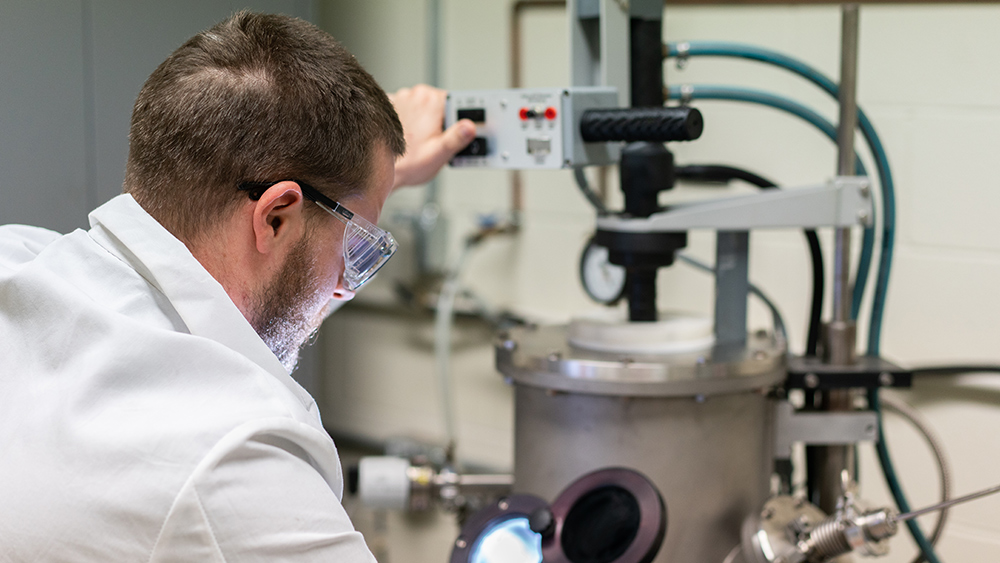Master's Degrees in Materials Science and Engineering, Specialization in AI for Materials Innovation
The master's degrees in Materials Science and Engineering with a Specialization in AI for Materials Innovation prepare the next generation of engineers to harness the power of AI in addressing complex materials challenges. This non-thesis program integrates a strong foundation in materials processing, characterization, and performance with modern AI tools for modeling, optimization, and data-driven insight.
Through advanced coursework and the AI-X Capstone Project, students gain hands-on experience applying state-of-the-art methods from both AI and Materials Science and Engineering to real-world problems. Graduates emerge ready to lead innovation across academia, industry, and beyond, where materials and intelligence meet.
Furthermore, students broaden their exposure to new topics through attendance at seminars and through coursework in specialized areas of MSEN.
I'm ready to apply! Request more information

Discover how AI is transforming material science. Explore the specialization below.
-
Students interested in the AI for Materials Innovation specialization apply to the Master of Science (M.S.) or Master of Engineering (M.Eng.) program in Materials Science and Engineering (MSEN) through the regular admissions process. After admission, students may declare this specialization by notifying the MSEN graduate advising office and selecting the AI for Materials Innovation degree plan.
-
This plan follows selected foundational and advanced MSEN coursework while integrating a focused sequence of classes in materials informatics, computational methods, and artificial intelligence, including:
- MSEN 660 – Materials Informatics
- MSEN 655 – Materials Design Studio
- MSEN 657 – Computational Materials Summer School
- MSEN 689 – AI-X Capstone (Exploration & Execution)
Students also complete selected AI-focused electives on topics such as Machine Learning, Deep Learning, Data Mining, Reinforcement Learning, Engineering Data Analysis, and others drawn from approved offerings in Computer Science and related disciplines.
This structure enables students to develop deep expertise in AI-powered Materials Science and Engineering.
-
A background in Materials Science and Engineering is not required to apply for this specialization. Students with undergraduate degrees in related engineering or science disciplines, including but not limited to Mechanical, Chemical, Electrical, Biomedical, Aerospace, and Civil Engineering, as well as Physics, Chemistry, and related fields, are strongly encouraged to apply.
For students with limited prior exposure to materials science, the program offers a foundational course, Fundamental Materials Science and Engineering, that covers essential principles in the structure, properties, processing, and performance of materials. This course ensures that all students begin with a strong foundation and can fully engage in advanced topics. This foundational course can be taken as one of the MSEN electives, strengthening students' background without extending the time to degree completion.
-
All Master’s applicants are automatically considered for the MSEN Pathways Fellowship, which includes a $1,000 award and a non-resident tuition waiver for the first year. Continuing students may also apply for the MSEN Fellowship, which offers similar benefits to support your academic journey. In addition to these departmental fellowships, some Master’s students may be eligible for College of EngineEring and University level funding, depending on the availability of funds and student qualifications. Students are also encouraged to explore student employment and fellowship opportunities for which they are eligible, including Jobs for Aggies and external fellowships.
For broader financial support, the Texas A&M Department of Student Financial Aid offers guidance on loans, grants, and employment resources.
-
Graduates are prepared for roles in advanced manufacturing, semiconductor and electronics design, energy storage and renewable energy, aerospace and defense materials development, and AI-driven research organizations. This specialization positions students to lead in fields where innovation, data, and materials engineering converge.
Ready to Take the Next Step?
Innovation in materials science begins with curiosity—and at Texas A&M, we’re here to help you turn that curiosity into impact. Whether you’re passionate about designing smarter materials, advancing AI-driven research, or shaping the technologies of tomorrow, this specialization provides the foundation to get there. If you have questions about the program, courses, or application process, we invite you to email our graduate advisors today. Our advisors are ready to help you explore how this degree can align with your goals and guide you toward a future of discovery.
